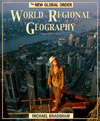 |  World Regional Geography: The New Global Order Update, 2/e Michael Bradshaw,
College of St. Mark and John
Europe
Chapter ObjectivesAfter reading and studying this chapter you should be able to:
| 1. Understand that Europe was the original core region and continues to
be very important. |
 |  |  | | 2. Describe how European culture was spread throughout the world. |
 |  |  | | 3. Chronicle the evolution of the European Union including its
significance. |
 |  |  | | 4. List the early peoples of Europe and their influence on Europe's
development. |
 |  |  | | 5. Describe the evolution of the Industrial Revolution including its
economic impacts and environmental consequences. |
 |  |  | | 6. Know that most of Europe is relatively close to seas and the Atlantic
Ocean and that the region has a long coastline. |
 |  |  | | 7. List Venice's problems related to its low lying location. |
 |  |  | | 8. Outline Europe's many mountain ranges, navigable rivers, and
peninsulas |
 |  |  | | 9. Understand the reasons why Western Europe, the industrial heartland,
is so important. |
 |  |  | | 10. Identify the consequences of zero population growth for Germany,
France, Spain, and other countries. |
 |  |  | | 11. Compare and contrast agriculture with manufacturing in Europe. |
 |  |  | | 12. Compare and contrast Germany with France, especially in terms of
economic development and politics. |
 |  |  | | 13. Describe the natural environment of Northern Europe and its effects on
the population, culture, and economy. |
 |  |  | | 14. Identify important similarities between Austria and Switzerland. |
 |  |  | | 15. Differentiate northern Italy from southern Italy. |
 |  |  | | 16. List similarities between Eastern Europe and Balkan Europe. |
 |  |  | | 17. Describe ethnic tensions in Balkan Europe and suggest reasons for
the conflicts. |
 |  |  | | 18. Discuss the role of tourism throughout Europe. |
 |  |  | | 19. Trace the evolution of town and city locations and patterns. |
 |  |  | | 20. List reasons why Western Europe may fall behind the United States
and Japan in the coming decades. |
|



 2002 McGraw-Hill Higher Education
2002 McGraw-Hill Higher Education